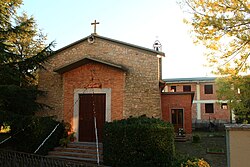
The province of Grosseto is a province in the Tuscany region of Italy. Its capital is the city of Grosseto. As of 2013 the province had a total population of 225,098 people.
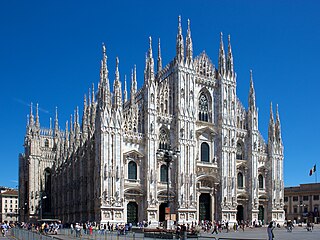
The Archdiocese of Milan is a Latin Church ecclesiastical territory or archdiocese of the Catholic Church in Italy which covers the areas of Milan, Monza, Lecco and Varese. It has long maintained its own Latin liturgical rite usage, the Ambrosian rite, which is still used in the greater part of the diocesan territory. Among its past archbishops, the better known are Ambrose, Charles Borromeo, Pope Pius XI and Pope Paul VI.

Bettona is an ancient town and comune of Italy, in the province of Perugia in central Umbria at the northern edge of the Colli Martani range. It is 5 km (3 mi) E of Torgiano and 12 km (7 mi) SW of Assisi. It is one of I Borghi più belli d'Italia. Passaggio, Colle, and Cerreto are frazioni of the comune.

Gavorrano is a mountain-side comune (municipality) in the Province of Grosseto in the western Italian region of Tuscany, located about 100 km (62 mi) southwest of Florence and about 25 km (16 mi) northwest of Grosseto. Gavorrano borders the municipalities of Castiglione della Pescaia, Grosseto, Massa Marittima, Roccastrada and Scarlino.
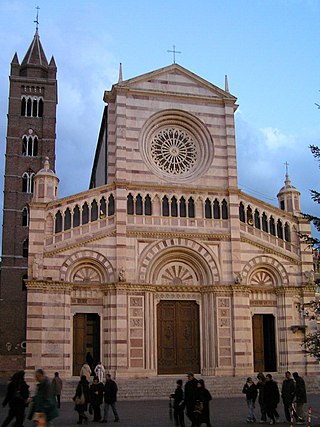
The Diocese of Grosseto is a Latin Church diocese of the Catholic Church in Italy, a suffragan of the archdiocese of Siena-Colle di Val d'Elsa-Montalcino, in Tuscany. Its current bishop is Giovanni Roncari, OFMCap.
The Diocese of Cingoli was a Roman Catholic diocese in Italy. It was founded in the 5th century. Nothing is heard of the diocese or of its bishops after the sixth decade of the 6th century. The time and reason for its cease is speculative. It was contained within the Papal States. The diocese was always immediately subject to the Holy See (Papacy). The effort to revive the diocese of Cingoli was begun during the reign of Pope Innocent XIII, the initiative coming from the town of Cingoli itself. Having received their memorial, on 26 August 1721, the Pope requested from Cardinal Orazio Spada his comments on each of the items mentioned by the Public of Cingoli. Archbishop Giustino Fontanini prepared a memorial of the information relevant to making a decision; it was dated 20 May 1723. Unfortunately Pope Innocent died on 7 March 1724, before the bulls could be prepared. The matter was left to the new pope, Benedict XIII (Orsini). In 1725, by virtue of the Bull "Romana Ecclesia" of 19 August 1725, Pope Benedict XIII revived the diocese of Cingoli, and united it aeque principaliter with the Diocese of Osimo to form the Diocese of Osimo e Cingoli.

The Diocese of Concordia-Pordenone is a Latin diocese of the Catholic Church situated in northeastern Italy, at the northern end of the Adriatic Sea, between Venice and Udine. Since 1818, Concordia Veneta, has been a suffragan of the Archdiocese of Venice. Bishop Andrea Casasola attended the Provincial Council of the Provincia Veneta in October 1859 as a suffragan of the Patriarch of Venice, Cardinal Giuseppe Luigi Trevisanato. The name of the diocese was changed to its present form in 1971.

The Diocese of Pitigliano-Sovana-Orbetello is a Latin Church diocese of the Catholic Church in the ecclesiastical province of the Metropolitan Archdiocese of Siena-Colle di Val d'Elsa-Montalcino, in Tuscany. The diocese of Sovana had originally been directly dependent upon the Holy See, and its bishops attended the pope's synods. When Pope Pius II, who was a Piccolomini of Siena, created the metropolitan archdiocese of Siena, he made Sovana one of its suffragan dioceses. The bishops of Sovana usually resided in the former palace of the Orsini in Pitigliano, which was given to Bishop Francesco Pio Santi (1776–1789) by the Grand Duke of Tuscany.

The Archdiocese of Ferrara-Comacchio is a Latin Church archdiocese of the Catholic Church. It has existed since 1986, when the diocese of Comacchio was combined with the historical archdiocese of Ferrara. It is a suffragan of the archdiocese of Bologna.

The Diocese of Diano (Teggiano)–Policastro (Latin: Dioecesis Dianensis-Policastrensis), is a Latin Church diocese of the Catholic Church in Campania, has existed since 1850, under its present name since 1986. In that year the Diocese of Diano (Teggiano) was united with the diocese of Policastro.
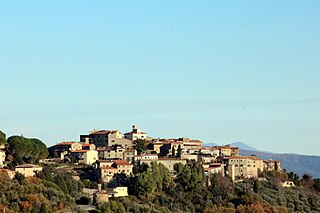
Giuncarico is a village in Tuscany, central Italy, administratively a frazione of the comune of Gavorrano, province of Grosseto. At the time of the 2001 census its population amounted to 399.
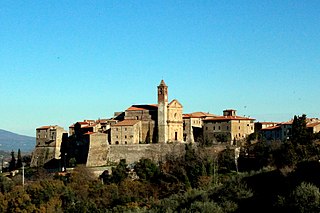
Caldana is a village in Tuscany, central Italy, administratively a frazione of the comune of Gavorrano, province of Grosseto. At the time of the 2001 census its population amounted to 980.

Pian di Rocca is a village in Tuscany, central Italy, administratively a frazione of the comune of Castiglione della Pescaia, province of Grosseto. At the time of the 2001 census its population amounted to 68.

Monsignor Vincenzo Regina was an Italian presbyter and historian.
Ernesto Ganelli was an Italian civil engineer who designed various public and religious buildings in Tuscany.

Manlio Sodi is an Italian theologian. Ordinary professor emeritus, he resides in the diocese of Montepulciano-Chiusi-Pienza. Sodi is the author of dictionaries, editor of series and periodicals, with numerous studies and articles published in Italian and foreign journals.

Medaglia Miracolosa is a Roman Catholic church in the city of Grosseto, Tuscany. It is located outside the city walls, in the suburb of Porta Nuova, with the facade overlooking Via Roma. It is the first church in Italy dedicated to the Miraculous Medal, a Marian devotion of French origin.

San Giuseppe is a Roman Catholic church in the city of Grosseto, Tuscany. Located in the western part of the city on Via Sauro, in the Barbanella neighborhood, it is the first parish church built in Grosseto outside the historic center.

San Giuseppe Benedetto Cottolengo is a Roman Catholic church in Grosseto, Tuscany. It is dedicated to St. Joseph Benedict Cottolengo, the founder of the Little House of Divine Providence. The church is situated in the eastern part of the city's urban area, on Via Scansanese, in the Alberino neighborhood.

Santa Famiglia is a Roman Catholic church in Grosseto, Tuscany. The church, along with the entire parish complex, is located on Via Unione Sovietica in the northeastern neighborhood of Sugherella, within the "167 Nord" public housing development. The church has also attracted interest due to its unusual appearance, which evokes the look of a mosque with minaret.
